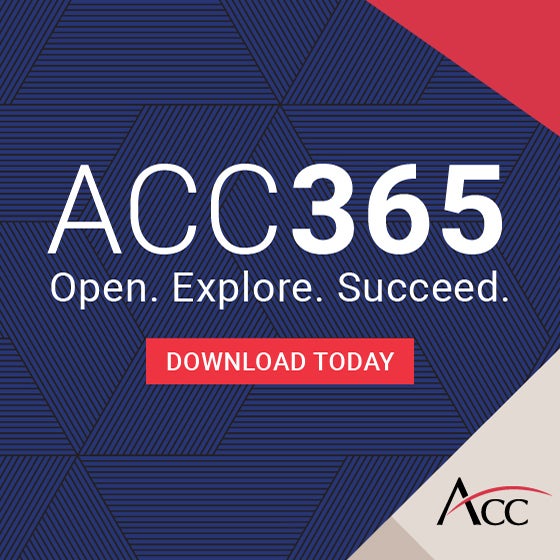Demonstrating your value when you’re new to in-house
As companies around the globe rolled out mandatory work from home requirements, a new challenge was felt by some - how to stay visible and demonstrate value while working away from the office environment.
Between them, ACC Australia members Theo Kapodistrias (New-to-in-house Committee Chair), Melissa Scott, Rebecca Taube and Courtenay Zajicek have over 32 years of in-house experience and in this article, they share their thoughts on how legal counsel, new to the sector, can demonstrate their value while working from home. In short, they believe value does not come through working more hours but rather focusing on demonstrating your value, whilst being authentic.
Focus on How You Communicate
Pandemic or not, Theo Kapodistrias suggests that the key to working from home is how you communicate. “With the ability to not only mute yourself on a conference call but also turn off your video, this is the ultimate way to become invisible. Hesitancy in being visibly seen may distract managers and colleagues from seeing your ability to contribute,” he suggests. Trust is inherently a human trait and not something you automatically find in an email address alone, so actively seeking out ways to ensure there is human connection will improve your positioning and visibility.
The other benefit to video calls is that they encourage colleagues to “see each other as people, rather than just their job titles,” says Rebecca Taube. With colleagues being able to see our remote backdrops; bookshelves, desk trinkets, children and pets, it shows the personal side to colleagues. In addition to video calls, the committee suggests joining your company’s virtual social events or casual online chats where you can post pictures of your pets, your weekend adventures, or latest cooking or gardening exploits, so colleagues see the person behind the job title - you may even find you share interests with others! For the times when a video call is not suitable, adding your photo to your online conference profile will assist people to know and remember who they are talking to.
Courtenay Zajicek shares that while many in-house counsel find themselves in more meetings than ever before, it is important to still make time to show up and be accessible. Being able to quickly respond to an urgent issue on Slack / Teams / Skype messenger / WhatsApp can be a great way to support quick resolutions. “Not all work will be strictly ‘legal’ and as lawyers you have a unique skillset that can be applied to different areas of the business; research, compiling information into guidance notes and briefs, negotiating, bigger picture thinking and risk mitigation. It’s a great idea to be available and open to supporting the business in other ways, other than legal”.
Adding True Value
There are a number of simple ways to ensure anyone new to in-house can add true value, all while working remotely.
- Ask yourself one short question, “Is the person in a better situation having engaged with me?” For example, if a colleague comes to you with a non-legal department issue, you can add value by directing them to where they can find the appropriate support. This doesn’t take much time and frames your business support as helpful; “You will need to talk to our colleagues in Compliance on this – they will be best placed to help you work out a way forward. I’ve found [NAME] to be a really helpful contact there.” Another suggested way to add value is by responding to an email by saying “Yes, this can be done but we need to cover off these three risks before we start…”, rather than a simple “no”.
- Check if you can truthfully finish your emails with, “Let me know if this doesn’t give you a way forward”. This could be as simple as redirecting someone to the right department.
- When managing expectations and deadlines it is important to be honest. Don’t be afraid to explain a heavy work load by saying “we’re having to triage our matters and prioritise those activities which will allow [our business] to [bring in revenue, cut costs, or which deliver our core strategy of xyz]”. Frame your response so your business client understands the bigger context. Of course, many factors influence why you would prioritise one thing over another – including if the request is coming from an executive versus a junior, so use this approach with careful consideration, and add in any “softeners” you need to, so that you can maintain their trust recommends Rebecca Taube.
- Include a ‘thank you for your patience’ statement rather than a ‘sorry this is taking so long’.
- “Thank you for your patience on this – I really appreciate it. We’re doing our best to ensure we prioritise the highest risk / highest value [contracts/activities] to best support [Business] right now.”
And if you need to, you can even say
- “If you think this issue needs to be escalated, email my manager directly, and we will work out how we can prioritise it in the context of our current workload demands.”
- “Thank you for your patience on this – I really appreciate it. We’re doing our best to ensure we prioritise the highest risk / highest value [contracts/activities] to best support [Business] right now.”
Translating the Law and Offering Advice
Tailoring advice to the exact needs of your business is key. In-house counsel add significant value when they are able to arm their business with clear, focused and pragmatic advice that will allow informed decision making.
The committee suggest that lawyers have a tendency to want to provide the perfect answer and highlight that some questions being asked in this pandemic are ones never asked before. Courtney suggests steering away from the idea of providing the ‘perfect answer’. “A discussion with stakeholders in a video conference rather than a formal email is the best way for my business to come to the best outcome. We workshop the ideas that lead to the least risk. An example of this was when we discussed updates to the Government’s stimulus packages. I didn’t send the leadership team a screenshot summary from the Government website but tailored the information in our call and then summarised it in a guidance note later so they can keep referring back to it.”
Melissa also explains that “there is no ‘perfect’ answer to provide”. The business needs something which helps enable them to get the job done and to support their operations. The perfect polished 20 page advice from our friends in private practice has its place, but often an answer which the business can use and run with is what is most valued”.
Understanding an Organisation’s Risk Tolerance
The idea of an acceptable level of risk is commonplace in an in-house lawyer's role and for those new to in-house there may be additional effort required to understand their organisation’s risk tolerance.
The committee’s advice on understanding risk tolerance largely goes back to earlier points about being visible. Melissa shares that being available for video calls helps not only build rapport, but reduces the risk of misaligned identification, classification, mitigation and monitoring of those risks. Through verbal queues and body language you will also be able to gauge how others are feeling about such risk, something you cannot get from a lengthy email.
Career Progression During Lockdown
With the ongoing pandemic, online learning has become increasingly popular as a means to continuing to improve on skills and knowledge. Virtual ‘coffee catch ups’ have also become the large and important way to nurture business relationships and network.
“Mentoring relationships are crucial during times like this, having someone to check-in on you and your progress with your own personal and professional goals has never been more important. Set time aside for yourself and consider what is important to you. Are your goals now still the same as they were pre-COVID, or have these shifted? What things could you be doing now to get to those goals? The ACC Australia Future Leaders Mentoring program is one place you can connect with other in-house counsel” recommends Theo, who has participated in the program as both a mentee and mentor.
For those new to in-house, looking to expand networks, don’t be afraid to reach out to someone on LinkedIn and ask if they would have a 15 minute (virtual) coffee. “At worst, you get a ‘sorry, I can’t right now’ or no reply at all”. At best, you get a connection, coach and informal mentor, and a new network opens up,” says Rebecca Taube.
There are many organisations and service providers offering free or low-cost webinars and classes in non-legal areas such as coding, customer behaviour and analytics, all of which could be of benefit to an in-house lawyer's skillset.
This pandemic has shown us there are many perks to working remotely however enhanced visibility is not one of them. This is not insurmountable though, by implementing some of the above suggestions you will be able to work diligently, deliver on your tasks and ensure the saying ‘out of sight, out of mind’ doesn’t ring true for you.
***
The New-to-in-house program is a network where lawyers, who are in the early stages of their career or have recently made the transition from private practice to the in-house, have the opportunity to acquire knowledge from, and network with other lawyers who are in a similar position, as well as have access to tailored learning opportunities. ACC Australia values peer-to-peer learning and believe that some of the most valuable development opportunities come from collaborating and communicating with those around us.
This article was written with speaker notes taken from the In the age of the corona crisis: how to demonstrate your value when you’re new to in-house? This is the title of the webinar, chaired by Theo Kapodistrias, General Counsel at UpGuard (New-to-in-house committee chair) and panellists Rebecca Taube, Deputy General Counsel at RMIT University, Melissa Scott, Senior Legal Counsel at Megaport and Courtenay Zajicek, Legal Counsel at Nando's Australia.
If you would like to watch this webinar, please click here.

